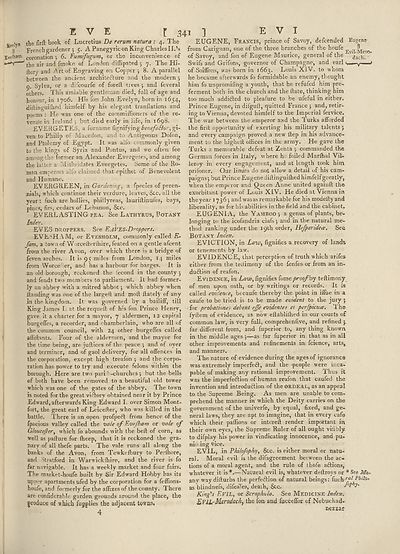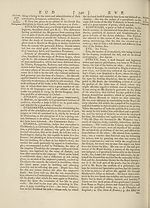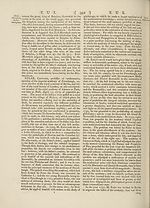Encyclopaedia Britannica, or, a Dictionary of arts, sciences, and miscellaneous literature : enlarged and improved. Illustrated with nearly six hundred engravings > Volume 8, ELE-FOR
(369) Page 341
Download files
Complete book:
Individual page:
Thumbnail gallery: Grid view | List view

EVE r 341 ] E V I
ftve] n t}je firft book of Lucretius De rerum natura : 4. The
V|l French gardener ; 5. A Panegyric on King Charles I I.’s
Evefh*"1 coronation *, 6. Fumifugum, or the inconvenience of
the air and fmoke of London diflipated ) 7. The Hi-
ftcry and Art of Engraving on Copper 5 8. A parallel
between the ancient architefture and the modern *,
9. Sylva, or a difcourfe of foreft trees ; and feveral
others. This amiable gentleman died, full of age and
honour, in 1706. His fon John Evelyn, born in 1654,
ditlinguilhed himfelf by his elegant tranflations and
poems : He was one of the commiffioners of the re¬
venue in Ireland 5 but died early in life, in 1698.
EVERGETES, a furname fignifying gi¬
ven to Philiu of Macedon, and to Antigonus Dolon,
and Ptolemy of Egypt. It was alfo commonly given
to the kings of Syria and Pontus, and we often fee
among the former an Alexander Evergetes, and among
the latter a Mithridates Evergetes. Some of the Ro¬
man emperors alfo claimed that epithet of Benevolent
and Humane.
EVERGREEN, in Gardening, a fpecies of peren¬
nials, which continue their verdure, leaves, &c. all the
year-: fuch are hollies, phillyreas, lauriftinufes, bays,
pines, fir«, cedars of Lebanon, &c.
EVERLASTING pea. See Lathyrus, Botany
Index.
EVES DROPPERS, See EAVES-Droppers.
EVE ■'HAM, or Evesholm, commonly called E-
famy a town of Worcefterihire, feated on a gentle afeent
from the river Avon, over which there is a bridge qf
feven arches. It is 95 miles from London, 14 miles
from Worceder, and has a harbour for barges. It is
an old borough, reckoned the (econd in the county j
and fends two members to parliament. It had former¬
ly an abbey with a mitred abbot 5 which abbey when
itanding was one of the largeft and molt ftately of any
in the kingdom. It was governed by a bailiff, till
King James I. at the requefl of h's fon Prince Henry,
gave it a charter for a mayor, 7 aldermen, 12 capital
burgefles, a recorder, and chamberlain, who are all of
the common council, with 24 other burgefles called
afliftants. Four of the aldermen, and the mayor for
the time being, are juftices of the peace ; and of oyer
and terminer, and of gaol delivery, for all offences in
the corporation, except high treafon •, and the corpo¬
ration has power to try and execute felons within the
borough. Here are two pari !-churches; but the bells
of both have been removed to a beautiful old tower
which was one of the gates of the abbey. 'I he town
is noted for the great viRory obtained near it by Prince
Edward, afterwards King Edward I. over Simon Mont-
fort, the great earl of Leicefler, who was killed in the
battle. L here is an open profpeft from hence of the
fpaeious valley called the vaie of Eve [ham or vale of
Gloucefler, which fo abounds with the bell: of corn, as
well as paflure for fheep, that it is reckoned the gra¬
nary of all thefe parts. The vale runs all along the
banks of the Avon, from Tewkefbury to Perfhore,
and Stratford in Warwickfhire, and the river is fo
far navigable. It has a weekly market and four fairs.
The market-houfe built by Sir Edward Hobby has its
upper apartments ufed by the corporation for a feflions-
houfe, and formerly for the aflizes of the county. There
are eonfiderable garden grounds around the place, the
produce of which fupplies the adjacent towns.
4
EUGENE, Francis, prince of Savoy, defeended Eugene
from Carignan, one of the three branches of the houfe ^
of Savoy, and fon of Eugene Maurice, general of the V‘dacho .
Swifs and Grifons, governor of Champagne, and earl Wp—y—
of Soiffons, was born in 1663. Louis XIV. to whom
he became afterwards fo formidable an enemy, thought
him fo unpromifing a youth, that he refufed him pre¬
ferment both in the church and the date, thinking him
too much addicted to pleafure to be ufeful in either.
Prince Eugene, in dilguit, quitted France j and, retir¬
ing to Vienna, devoted himfelf to the Imperial fervice.
The war between the emperor aad the l urks afforded
the firit opportunity of exerting his military talents j
and every campaign proved a new ftep in his advance¬
ment to the higheft offices in the army. He gave the
Turks a memorable defeat at Zenta •, commanded the
German forces in Italy, where h foiled Marffial Vil<-
leroy in every engagement, and at length took him
prifoner. Our limits do not allow a detail of his cam¬
paigns j but Prince Eugene didinguiffied himfelf greatly,
when the emperor and Queen Anne united againd the
exorbitant power of Louis XIV. He died at Vienna in
the year 1736; and was as remarkable for his modedy and
liberality, as for his abilities in the field and the cabinet.
EUGENIA, the Yamboo ; a genus of plants, be¬
longing to the icofandria clafs j and in the natural me¬
thod ranking under the 19th order, Hefpsrideae, Sec
Botany Index.
EVICTION, in Lav:, fignifies a recovery of lands
or tenements by law.
EVIDENCE, that perception of truth which arifes
either from the tedimony of the fenfes or from an in¬
duction of reafon.
Evidence, in Laxt*, fignifies feme proof by tedimony
of men upon oath, or by writings or records. It is
called evidence, becaufe thereby the point in iffue in a
caufe to be tried is to be made evident to the jury ;
■ for probationer debent effe evidentes et perfpicuce. The
fydem of evidence, as now edablidied in our courts of
common law, is very full, comprehenfive, and refined j
far different from, and fuperior to, any thing known
in the middle ages4—as far fuperior in that as in all
other improvements and refinements in feience, arts,
and manners.
The nature of evidence during the ages of ignorance
was extremely imperfeCt, and the people were inca¬
pable of making any rational improvement. Thus it
was the imperfeCtion of human reafon that caufed the
invention and introduction of the ordeal, as an appeal
to the Supreme Being. As men are unable to com¬
prehend the manner in which the Deity carries on the
government of the univerfe, by equal, fixed, and ge¬
neral laws, they are apt to imagine, that in every cafe
which their padions or intered render important in
their own eyes, the Supreme Ruler of all ought vilibly
to difplay his power in vindicating innocence, and pu¬
micing vice.
EVIL, in Pbi/ofop/u/, &c. is either moral or natu¬
ral. Moral evil is the difagreement between the ac»
tions of a moral agent, and the rule of thofe aCtions,
whatever it is*.—Natural evil is, whatever dedrovs or *See Afo*
any way didurbs the perfection of natural beings: fuch ^ Phila,
as blindnefs, difeales, death, &c. Mty.
King's Evil, or Scrophula. See Medicine Index.
EVlirMeiodaclif the fon and fucceffor of Nebuchad-
nezzas
ftve] n t}je firft book of Lucretius De rerum natura : 4. The
V|l French gardener ; 5. A Panegyric on King Charles I I.’s
Evefh*"1 coronation *, 6. Fumifugum, or the inconvenience of
the air and fmoke of London diflipated ) 7. The Hi-
ftcry and Art of Engraving on Copper 5 8. A parallel
between the ancient architefture and the modern *,
9. Sylva, or a difcourfe of foreft trees ; and feveral
others. This amiable gentleman died, full of age and
honour, in 1706. His fon John Evelyn, born in 1654,
ditlinguilhed himfelf by his elegant tranflations and
poems : He was one of the commiffioners of the re¬
venue in Ireland 5 but died early in life, in 1698.
EVERGETES, a furname fignifying gi¬
ven to Philiu of Macedon, and to Antigonus Dolon,
and Ptolemy of Egypt. It was alfo commonly given
to the kings of Syria and Pontus, and we often fee
among the former an Alexander Evergetes, and among
the latter a Mithridates Evergetes. Some of the Ro¬
man emperors alfo claimed that epithet of Benevolent
and Humane.
EVERGREEN, in Gardening, a fpecies of peren¬
nials, which continue their verdure, leaves, &c. all the
year-: fuch are hollies, phillyreas, lauriftinufes, bays,
pines, fir«, cedars of Lebanon, &c.
EVERLASTING pea. See Lathyrus, Botany
Index.
EVES DROPPERS, See EAVES-Droppers.
EVE ■'HAM, or Evesholm, commonly called E-
famy a town of Worcefterihire, feated on a gentle afeent
from the river Avon, over which there is a bridge qf
feven arches. It is 95 miles from London, 14 miles
from Worceder, and has a harbour for barges. It is
an old borough, reckoned the (econd in the county j
and fends two members to parliament. It had former¬
ly an abbey with a mitred abbot 5 which abbey when
itanding was one of the largeft and molt ftately of any
in the kingdom. It was governed by a bailiff, till
King James I. at the requefl of h's fon Prince Henry,
gave it a charter for a mayor, 7 aldermen, 12 capital
burgefles, a recorder, and chamberlain, who are all of
the common council, with 24 other burgefles called
afliftants. Four of the aldermen, and the mayor for
the time being, are juftices of the peace ; and of oyer
and terminer, and of gaol delivery, for all offences in
the corporation, except high treafon •, and the corpo¬
ration has power to try and execute felons within the
borough. Here are two pari !-churches; but the bells
of both have been removed to a beautiful old tower
which was one of the gates of the abbey. 'I he town
is noted for the great viRory obtained near it by Prince
Edward, afterwards King Edward I. over Simon Mont-
fort, the great earl of Leicefler, who was killed in the
battle. L here is an open profpeft from hence of the
fpaeious valley called the vaie of Eve [ham or vale of
Gloucefler, which fo abounds with the bell: of corn, as
well as paflure for fheep, that it is reckoned the gra¬
nary of all thefe parts. The vale runs all along the
banks of the Avon, from Tewkefbury to Perfhore,
and Stratford in Warwickfhire, and the river is fo
far navigable. It has a weekly market and four fairs.
The market-houfe built by Sir Edward Hobby has its
upper apartments ufed by the corporation for a feflions-
houfe, and formerly for the aflizes of the county. There
are eonfiderable garden grounds around the place, the
produce of which fupplies the adjacent towns.
4
EUGENE, Francis, prince of Savoy, defeended Eugene
from Carignan, one of the three branches of the houfe ^
of Savoy, and fon of Eugene Maurice, general of the V‘dacho .
Swifs and Grifons, governor of Champagne, and earl Wp—y—
of Soiffons, was born in 1663. Louis XIV. to whom
he became afterwards fo formidable an enemy, thought
him fo unpromifing a youth, that he refufed him pre¬
ferment both in the church and the date, thinking him
too much addicted to pleafure to be ufeful in either.
Prince Eugene, in dilguit, quitted France j and, retir¬
ing to Vienna, devoted himfelf to the Imperial fervice.
The war between the emperor aad the l urks afforded
the firit opportunity of exerting his military talents j
and every campaign proved a new ftep in his advance¬
ment to the higheft offices in the army. He gave the
Turks a memorable defeat at Zenta •, commanded the
German forces in Italy, where h foiled Marffial Vil<-
leroy in every engagement, and at length took him
prifoner. Our limits do not allow a detail of his cam¬
paigns j but Prince Eugene didinguiffied himfelf greatly,
when the emperor and Queen Anne united againd the
exorbitant power of Louis XIV. He died at Vienna in
the year 1736; and was as remarkable for his modedy and
liberality, as for his abilities in the field and the cabinet.
EUGENIA, the Yamboo ; a genus of plants, be¬
longing to the icofandria clafs j and in the natural me¬
thod ranking under the 19th order, Hefpsrideae, Sec
Botany Index.
EVICTION, in Lav:, fignifies a recovery of lands
or tenements by law.
EVIDENCE, that perception of truth which arifes
either from the tedimony of the fenfes or from an in¬
duction of reafon.
Evidence, in Laxt*, fignifies feme proof by tedimony
of men upon oath, or by writings or records. It is
called evidence, becaufe thereby the point in iffue in a
caufe to be tried is to be made evident to the jury ;
■ for probationer debent effe evidentes et perfpicuce. The
fydem of evidence, as now edablidied in our courts of
common law, is very full, comprehenfive, and refined j
far different from, and fuperior to, any thing known
in the middle ages4—as far fuperior in that as in all
other improvements and refinements in feience, arts,
and manners.
The nature of evidence during the ages of ignorance
was extremely imperfeCt, and the people were inca¬
pable of making any rational improvement. Thus it
was the imperfeCtion of human reafon that caufed the
invention and introduction of the ordeal, as an appeal
to the Supreme Being. As men are unable to com¬
prehend the manner in which the Deity carries on the
government of the univerfe, by equal, fixed, and ge¬
neral laws, they are apt to imagine, that in every cafe
which their padions or intered render important in
their own eyes, the Supreme Ruler of all ought vilibly
to difplay his power in vindicating innocence, and pu¬
micing vice.
EVIL, in Pbi/ofop/u/, &c. is either moral or natu¬
ral. Moral evil is the difagreement between the ac»
tions of a moral agent, and the rule of thofe aCtions,
whatever it is*.—Natural evil is, whatever dedrovs or *See Afo*
any way didurbs the perfection of natural beings: fuch ^ Phila,
as blindnefs, difeales, death, &c. Mty.
King's Evil, or Scrophula. See Medicine Index.
EVlirMeiodaclif the fon and fucceffor of Nebuchad-
nezzas
Set display mode to:
![]() Universal Viewer |
Universal Viewer | ![]() Mirador |
Large image | Transcription
Mirador |
Large image | Transcription
Images and transcriptions on this page, including medium image downloads, may be used under the Creative Commons Attribution 4.0 International Licence unless otherwise stated. ![]()
| Permanent URL | https://digital.nls.uk/192268216 |
|---|
| Attribution and copyright: |
|
|---|
| Description | Ten editions of 'Encyclopaedia Britannica', issued from 1768-1903, in 231 volumes. Originally issued in 100 weekly parts (3 volumes) between 1768 and 1771 by publishers: Colin Macfarquhar and Andrew Bell (Edinburgh); editor: William Smellie: engraver: Andrew Bell. Expanded editions in the 19th century featured more volumes and contributions from leading experts in their fields. Managed and published in Edinburgh up to the 9th edition (25 volumes, from 1875-1889); the 10th edition (1902-1903) re-issued the 9th edition, with 11 supplementary volumes. |
|---|---|
| Additional NLS resources: |
|

